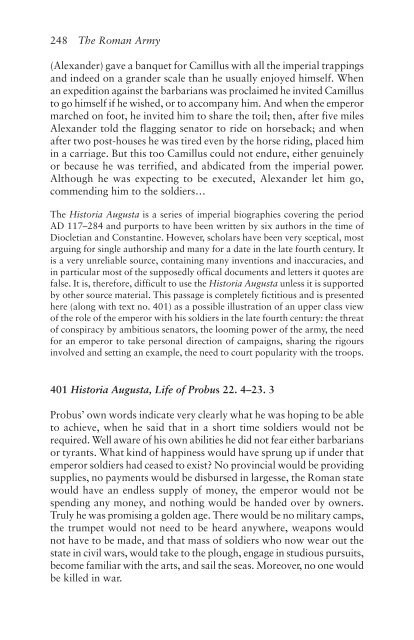The Roman Army, 31 BC–AD 337: A Sourcebook
The Roman Army, 31 BC–AD 337: A Sourcebook
The Roman Army, 31 BC–AD 337: A Sourcebook
You also want an ePaper? Increase the reach of your titles
YUMPU automatically turns print PDFs into web optimized ePapers that Google loves.
248 <strong>The</strong> <strong>Roman</strong> <strong>Army</strong><br />
(Alexander) gave a banquet for Camillus with all the imperial trappings<br />
and indeed on a grander scale than he usually enjoyed himself. When<br />
an expedition against the barbarians was proclaimed he invited Camillus<br />
to go himself if he wished, or to accompany him. And when the emperor<br />
marched on foot, he invited him to share the toil; then, after five miles<br />
Alexander told the flagging senator to ride on horseback; and when<br />
after two post-houses he was tired even by the horse riding, placed him<br />
in a carriage. But this too Camillus could not endure, either genuinely<br />
or because he was terrified, and abdicated from the imperial power.<br />
Although he was expecting to be executed, Alexander let him go,<br />
commending him to the soldiers…<br />
<strong>The</strong> Historia Augusta is a series of imperial biographies covering the period<br />
AD 117–284 and purports to have been written by six authors in the time of<br />
Diocletian and Constantine. However, scholars have been very sceptical, most<br />
arguing for single authorship and many for a date in the late fourth century. It<br />
is a very unreliable source, containing many inventions and inaccuracies, and<br />
in particular most of the supposedly offical documents and letters it quotes are<br />
false. It is, therefore, difficult to use the Historia Augusta unless it is supported<br />
by other source material. This passage is completely fictitious and is presented<br />
here (along with text no. 401) as a possible illustration of an upper class view<br />
of the role of the emperor with his soldiers in the late fourth century: the threat<br />
of conspiracy by ambitious senators, the looming power of the army, the need<br />
for an emperor to take personal direction of campaigns, sharing the rigours<br />
involved and setting an example, the need to court popularity with the troops.<br />
401 Historia Augusta, Life of Probus 22. 4–23. 3<br />
Probus’ own words indicate very clearly what he was hoping to be able<br />
to achieve, when he said that in a short time soldiers would not be<br />
required. Well aware of his own abilities he did not fear either barbarians<br />
or tyrants. What kind of happiness would have sprung up if under that<br />
emperor soldiers had ceased to exist? No provincial would be providing<br />
supplies, no payments would be disbursed in largesse, the <strong>Roman</strong> state<br />
would have an endless supply of money, the emperor would not be<br />
spending any money, and nothing would be handed over by owners.<br />
Truly he was promising a golden age. <strong>The</strong>re would be no military camps,<br />
the trumpet would not need to be heard anywhere, weapons would<br />
not have to be made, and that mass of soldiers who now wear out the<br />
state in civil wars, would take to the plough, engage in studious pursuits,<br />
become familiar with the arts, and sail the seas. Moreover, no one would<br />
be killed in war.



